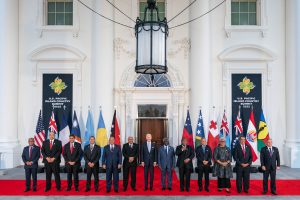In September 2023, Fijian Prime Minister Sitiveni Rabuka stood at the United Nations General Assembly podium and delivered a speech outlining his “Zone of Peace” concept. In a region drawn into geostrategic competition between the United States and China, Rabuka envisioned a Pacific space free from great power division and serving the global good. Underpinning the concept are key Pacific Island security instruments, such as the 2050 Strategy for the Blue Pacific Continent and Boe Declaration, as well as multilateral solutions to global challenges.
As the U.S. presidential campaigns roll toward election day on November 5, Rabuka’s Zone of Peace will struggle to make an impact on the two candidates vying for the White House, Kamala Harris and Donald Trump.
While they may differ on critical issues for the Pacific, the climate crisis and multilateralism, both see China as the primary external threat to U.S. interests. This fear will drive continued United States interest in the Pacific.
It’s worth looking at the policy proposals of Harris and Trump to get to grips with how these two candidates will attempt to shape the Pacific in the coming years.
For Trump, there is no mention of the climate crisis in the his platform, or Agenda47. This is in line with the former president’s actions, such as withdrawal from the Paris climate agreement in 2019 citing “unfair economic burdens” placed on U.S. workers and businesses. In this election cycle, Trump has maintained his position that the climate crisis is “one of the great scams of all time.”
Trump’s attachment to the “drill, baby, drill” ethos of expanding oil and gas production in the U.S. has led to climate experts lining up to express alarm.
Chapter 10 of the Republican Party platform, “Return to Peace Through Strength,” details what U.S. foreign policy and security will look like under Trump 2.0. The America First agenda is clear, with “countering China” at the top of the list. Further, “strengthening alliances,” Trump’s version of multilateralism, reads as what allies can do for the United States rather than the other way round.
What happens to AUKUS, the security partnership between Australia, the U.K., and the U.S., could come down to sufficient expressions, financial or rhetorical, of support for the United States’ military interests in Oceania.
However, the Heritage Foundation-led Project 2025 takes a more strident approach. Although Heritage is adamant that Project 2025 is an initiative independent of the Republican Party, Trump, in private, has not been so circumspect.
In Project 2025’s 922-page policy blueprint, “Mandate for Leadership: The Conservative Promise,” contributors propose reform of USAID for its “climate extremism” and purging the State Department’s senior leadership for its leftist tendencies.
While these proposals will impact how the United States interacts with the globe and not just the Pacific, a recent Heritage report outlining a future U.S. policy in the region declares, “The U.S. must adopt a clear-eyed approach about putting American interests and objectives in the Pacific Islands first.”
In her role as vice president, Harris delivered remarks to the Pacific Islands Forum (PIF) in 2022, announcing a new round of U.S. initiatives, such as expanding Washington’s diplomatic presence, the promise of more funding, and re-establishing USAID in Oceania through a Suva office.
Although virtual, Harris’ presence at the PIF leader’s meeting was just one among a series of diplomatic visits, summits, and agreements the Biden administration has undertaken with Pacific Island states.
It’s tempting to put all this activity down to the alliance building and multilateralist tendencies of the Democratic Party; however, the United States’ “step-up” in Oceania began under the Trump administration with the Pacific Pledge. Under both Trump 1.0 and Biden, interest in the Pacific stemmed from concern over Chinese political and economic influence.
Harris’ platform, “A New Way Forward,” doesn’t waver from the China threat theme by pledging to make “sure that America, not China, wins the competition for the 21st century.” Like Trump, under a President Harris the U.S. military will have a significant say in how a rules-based international order is enforced.
Critically, Harris takes a stand on climate and commits the United States to “global cooperation” on tackling the crisis and standing with allies to confront autocracy.
Pacific Island political leaders have kept their preference for U.S. president to themselves, which is primarily the diplomatic norm. But what becomes immediately apparent in contrasting Harris and Trump’s platforms is one commonality: the continued competition with China for global political and economic power, including in the Pacific.
Within this competition, there is a complication. If the rationale for upping the United States’ presence in Oceania is to protect U.S. interests, then what of the interests of Pacific Islanders?
Downsizing USAID, gutting the State Department, and climate denialism while upping funds for the U.S. Indo-Pacific Command doesn’t square with Sitiveni Rabuka’s “Zone of Peace.”
However, for Harris, if the steps made under the Biden administration are to have any impact, following through on funding promises, particularly on climate, is only the beginning.
Ultimately, if the U.S. presidential candidates view the rest of the world, and Oceania, through the lens of competition with China, then only the interests of those who wield great power will prevail.
Originally published under Creative Commons by 360info™.

































